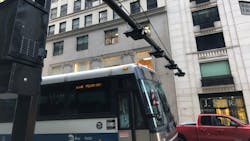Could New Jersey get a slice of the congestion pricing revenues, now that the plan to charge $15 to enter lower Manhattan has gone to the federal government for final approval?
The Metropolitan Transportation Authority’s boss hinted that could happen.
The final step needed to start charging the $15 congestion pricing fee to non-commercial passenger vehicles entering Manhattan’s Central Business District south of 60th Street has been submitted to the Federal Highway Administration for final approval, Janno Liber, MTA’s CEO, said at the Crain’s New York Business Breakfast forum Wednesday.
If final approval is granted, the MTA could start charging the fee as soon as June 15, unless a court decision in one of several suits filed in New Jersey and New York stops it.
In addition to mentioning overnight discounts and a deeper discounts for low income drivers from New Jersey as benefits to the state, he said “there is a portion of the mitigation that is actually being allocated to communities that, through their own decision making, they can invest in things that mitigate the impact.”
Lieber did not say how much money New Jersey could get when asked by a reporter.
Part of the federal lawsuits filed by New Jersey, Fort Lee and Bergen County challenging the FHWA’s approval of congestion pricing are about a lack of revenue sharing to mitigate the effects of increased traffic and air pollution the MTA’s Environmental Assessment predicted could affect Bergen County. Both the FHWA and MTA have already pledged roughly $150 million to mitigate similar added traffic and resulting pollution in the Bronx.
The assessment identified higher levels of traffic and air pollution in Bergen due to traffic using the George Washington Bridge to detour around the congestion zone.
“The way that all of this is determined is allocations by the number of people who are in areas impacted by initial truck traffic, and New Jersey will get its share, exactly on the arithmetic,” Lieber said in response to a reporter’s question.
“Remember the analysis that was done in the federal environmental review was based on a worst-case scenario of all the different scenarios, the horror of horrors scenario,” he said.
The actual scenario the MTA voted on, “turns out is going to have much less impact on truck traffic,” Lieber added.
A spokeswoman for Gov. Phil Murphy’s office declined to comment.
Congestion pricing, which was approved by New York legislature in 2019, is designed to reduce traffic, crashes, air pollution and raise $1 billion annually for MTA subway, bus and commuter rail projects. A projected 80,00 to 110,000 commuters are forecasted to switch from driving to using mass transit, MTA officials said.
NJ Transit officials said they have no forecast of how many people could switch to its trains and buses, when state legislators asked during budget hearings this week. The MTA’s report forecast single digit ridership increases for NJ Transit and PATH when congestion pricing takes effect.
The MTA board of directors approved the final rates on March 27 that include the $15 charge for non-commercial passenger vehicles using E-ZPass, $22.50 for non E-ZPass, higher rates for trucks based on size and charter buses during the peak hours of 5 a.m. to 9 p.m. Passenger vehicles that use Hudson and East River tunnels will receive a $5 toll credit toward the congestion fee.
Those rates are now with the FHWA to determine if it is keeping with a Finding of No Significant Impact issued for the congestion pricing Environmental Assessment, Lieber said.
New Jersey sued the FHWA last July and later the MTA contending a full Environmental Impact Statement study should be done and that the assessment downplayed the effects on other New Jersey towns and counties.
A decision whether to throw out the federal approval and order an Environmental Impact Statement study be done is in the hands of U.S. District Court Senior Judge Leo M. Gordon, who listened to two days of arguments from attorneys representing entities for and against congestion pricing earlier this month.
Our journalism needs your support. Please subscribe today to NJ.com.
Larry Higgs may be reached at [email protected]. Follow him on X @CommutingLarry
©2024 Advance Local Media LLC. Visit nj.com. Distributed by Tribune Content Agency, LLC.



